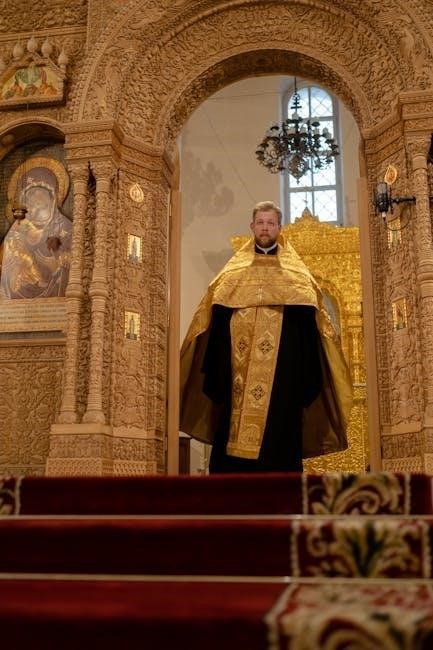
Christianity is a monotheistic religion centered on the life, teachings, death, and resurrection of Jesus Christ. It emphasizes the Holy Trinity and the authority of the Bible.
Definition and Overview
Christianity is a monotheistic religion centered on the belief in one God, who is worshipped as the Holy Trinity: the Father, the Son (Jesus Christ), and the Holy Spirit. It is rooted in the life, teachings, death, and resurrection of Jesus Christ, who is regarded as the Savior of humanity. The Bible, comprising the Old and New Testaments, serves as the primary source of Christian doctrine and moral guidance. Christianity emphasizes salvation through faith in Jesus Christ and the grace of God, distinguishing it from other religions. Its core principles include love, forgiveness, and the promise of eternal life. The faith is practiced through worship, prayer, and adherence to teachings that foster compassion and moral living. Christianity has become a global religion, shaping cultures and societies worldwide.
Historical Context and Origins
Christianity originated in the 1st century AD, emerging from Judaism in the Roman Empire. It began with the ministry of Jesus Christ, a Jewish preacher, and his teachings about the Kingdom of God. After his crucifixion and resurrection, his disciples, including Peter and Paul, spread his message, establishing the early Christian church in Jerusalem. The faith expanded rapidly, particularly after the destruction of the Temple in Jerusalem in 70 AD, which led to the dispersion of Jewish Christians. The conversion of Paul, a former persecutor of Christians, played a pivotal role in spreading the faith to Gentiles (non-Jews). By the 4th century, Christianity became the dominant religion in the Roman Empire under Emperor Constantine, who legalized it in 313 AD. This historical journey shaped Christianity into a global faith.
Core Beliefs of Christianity
Christianity centers on the belief in one God in three divine persons: the Father, Son (Jesus Christ), and Holy Spirit. It emphasizes salvation through faith in Jesus’ sacrifice and resurrection.
The Trinity: God the Father, Jesus Christ, and the Holy Spirit
The Trinity is a central doctrine in Christianity, describing God as three distinct, coequal, and eternal persons: the Father, the Son (Jesus Christ), and the Holy Spirit. The Father is often seen as the creator and sovereign ruler, while Jesus, as the Son, is believed to be fully divine and fully human, serving as the savior of humanity. The Holy Spirit is understood as the active presence of God, guiding believers and empowering them for spiritual life. This triune nature of God is mysterious but fundamental to Christian faith, reflecting a unity of essence and diversity of roles. The Trinity is not three separate gods but one God in three persons, a concept unique to Christianity and essential for understanding its theology and worship.
The Bible as the Holy Scripture
The Bible is the sacred text of Christianity, serving as the primary source of faith and practice. It consists of the Old Testament, which chronicles God’s relationship with Israel and anticipates the coming of Jesus Christ, and the New Testament, which records the life, teachings, death, and resurrection of Jesus, along with the early Christian church. The Bible is divided into 66 books, written by various authors under divine inspiration. Christians believe the Bible is the authoritative word of God, providing guidance for beliefs, moral conduct, and spiritual growth. Key sections include the Gospels, which narrate Jesus’ life, and the Epistles, which offer teachings for the church. The Bible’s authority is central to Christian doctrine and worship.

The Life and Significance of Jesus Christ
Jesus Christ is the central figure of Christianity, viewed as the Son of God and Savior. His life, death, and resurrection are the foundation of Christian faith.
Jesus as the Son of God and Savior
Jesus Christ is affirmed by Christians as both fully human and fully divine, the Son of God, and the world’s Savior. His divine nature is central to the belief that He was sent by God to redeem humanity from sin. Through His life, teachings, death, and resurrection, Jesus provided salvation for all people. This belief is rooted in the Bible, where Jesus is described as the Messiah and the only way to eternal life. His role as Savior emphasizes His sacrifice on the cross, which Christians believe atoned for humanity’s sins, offering forgiveness and eternal life to those who have faith in Him. This doctrine is the cornerstone of Christian theology and practice.
The Crucifixion, Resurrection, and Their Implications
The crucifixion of Jesus Christ is viewed as a sacrificial act of atonement for humanity’s sins, demonstrating God’s love and mercy. His death on the cross symbolizes the ultimate redemption, fulfilling Old Testament prophecies. The resurrection of Jesus, three days later, is celebrated as a triumph over death and sin, confirming His divine authority and the promise of eternal life. These events are central to Christian faith, representing the core of salvation and hope. The crucifixion and resurrection underscore Jesus’ role as Savior, offering forgiveness and reconciliation with God. They are commemorated through rituals like Easter and are foundational to Christian theology, inspiring believers to live with purpose and hope in eternal life.

Christian Doctrine and Practices
Christian doctrine is rooted in scripture and the teachings of Jesus Christ. Central practices include worship, prayer, and participating in sacraments like baptism and communion.
Salvation Through Faith and Grace
Christianity teaches that salvation is a gift from God, achieved through faith in Jesus Christ. This doctrine emphasizes that salvation is not earned by good works but is granted by God’s grace. The Bible states in Ephesians 2:8-9 that salvation is “by grace through faith” and not by human effort. This belief underscores the idea that humanity’s sinful nature separates us from God, but through faith in Jesus’ sacrifice, believers are reconciled to Him. The concept of grace highlights God’s unconditional love and mercy, offering redemption to all people. This central doctrine distinguishes Christianity from other belief systems and forms the foundation of Christian hope and spiritual life. It is a cornerstone of the Christian gospel, inspiring followers to live in gratitude and obedience to God.
Sacraments and Worship Practices
Christian worship practices and sacraments are central to expressing faith and connecting with God. Sacraments, considered sacred acts instituted by Christ, vary across denominations. Many recognize baptism and the Eucharist as fundamental. Baptism symbolizes spiritual rebirth, while the Eucharist commemorates Christ’s sacrifice. Other sacraments, like confession and marriage, are observed in some traditions; Worship typically includes prayer, hymns, and scripture readings, emphasizing community and individual devotion. These practices, rooted in biblical teachings, foster spiritual growth and unity among believers. They reflect Christianity’s commitment to honoring God and nurturing faith through shared rituals and personal devotion.
Christianity remains a profoundly influential monotheistic faith, shaping cultures and lives globally. Its core beliefs in the Holy Trinity and salvation through Jesus Christ continue to inspire millions, ensuring its enduring relevance in the modern world.
The Impact of Christianity in the Modern World

Christianity continues to shape global cultures, ethics, and societies. Its teachings on compassion, forgiveness, and love inspire millions, influencing movements for social justice and human rights. The faith has historically driven education, healthcare, and charitable endeavors, establishing institutions that serve diverse communities. Despite secularization in some regions, Christianity remains a unifying force, fostering dialogue and cooperation across cultures. Its emphasis on moral values and personal transformation resonates in contemporary debates on identity, purpose, and meaning. As a global religion, Christianity adapts to modern challenges while retaining its core message, ensuring its enduring relevance in a rapidly changing world.
